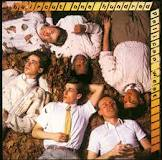special agent
I met my literary agent Jo Unwin over coffee at the York Writing Festival in 2010 and I have to confess that, had I known who she was, I would never have dared to sit next to her. This isn’t because she’s not lovely (she is very lovely), but because back then, agents were a breed apart for me, and I knew I’d probably look like a complete arse the minute I opened my mouth. I was sitting at the wrong angle to see her name badge, which had a red spot on it to show she was ‘Industry’. By the time I noticed it was too late, and I’d said all manner of arse-ish things already. I should say upfront that she is a class act, and pretended not to notice.
So what does an agent do? When I was drafting this post, I was asked (by @dicconb), ‘Does your agent also have to be your friend, or is being an agent enough?’ My own feeling is that ‘enough’ encompasses a huge number of roles already, without us reminiscing about Haircut 100 or sending each other You Tube videos of cats being funny. (Like this one.)

An agent will get you a book deal and negotiate contracts, but after that point there are a hundred different things she continues to do, some of it so behind-the-scenes that even the author is unaware of it.
I’m just wondering now whether she’s roaring with laughter at that ‘even’.
Your agent will promote your book tirelessly, liaise with your editor, persuade and cajole anyone she needs to (again: ‘even’ the author), give good news, give bad news, be unremittingly positive because your novel is brilliant – and anyone who can’t see that is an idiot! Crucially, she will also be a sounding board for your work-in-progress and thus sees your manuscript (and therefore you) in a somewhat raw state. She has to judge when to encourage, and when to administer a swift kick to the seat of your pants. You may tell her about your relationships, your mental state, your family life. One very successful writer told me that her agent had earned her undying gratitude by clearing her schedule when her dog died.
Jo’s been shortlisted for Literary Agent of the Year, and has been praised by The Bookseller for finding ‘slushpile gold’. That ‘gold’ includes Booker-shortlisted Stephen Kelman (Pigeon English), and Rebecca James (Beautiful Malice). Her list includes literary fiction, Young Adult books, and celebrity clients such as Eddie Izzard and Vic Reeves.
Also, she once sent me a chocolate bar in the post when I hit a tricky patch in the manuscript

Yep, that just about covers all the important things.
I’ve interviewed her here about the highs, lows and liquid lunches of agenting.
How did you get into agenting?
Very belatedly. I had been an actress and writer for TV, when I suddenly realised that I was working in completely the wrong medium. My favourite thing in the world was to get really excited about a book I’d read, and tell people all about it. I often felt I was single-handedly making a book I loved a bestseller by telling everyone I knew that they just had to read it. So imagine my delight when I discovered that that was a job – and one you could get paid for. Patrick Walsh and Clare Conville took a gamble on me, as I had no track record, and I am still incredibly grateful to them.
What’s your typical day like?
There’s really no such thing. Which is one of the great joys of being an agent. But one thing’s for sure: there isn’t time in the working day to read – all our reading is done in our own free time, so people should bear that in mind when they are waiting a frustratingly long time for a response from us.
Having watched you work, I can see that agenting is a multi-skilled job. You’re an editor, a negotiator, a diplomat, a counsellor – and the rest. Which parts of the job do you most enjoy?
I like the lunches and the heavy drinking, mainly.
What are the high points in your job? And the low points?
It is unbelievably frustrating when a book you love, written by an author you believe in, for one reason or another just doesn’t chime with an editor. So especially if that’s happened, and then you do find a home for a book, it is a fantastic vindication – and a phenomenal high.
Do you think agents gain anything from being on Twitter? (NB: readers, this is a MEAN QUESTION, since Jo tweets about once a year, and then has to lie down in a dark room to recover.)
No.
Securing an agent is a hugely competitive business. Do you think the playing field is level for all writers? I’m thinking here of the frequent claims that people get published through contacts, and also about M.A. courses, paid-for workshops, editorial services, and so on.
I actually think that good writers are people who write. And write and write and write. And who are professional enough to know when they need some support, paid for or not. People do get better with practice, and perhaps they get better faster when they’re taught. Most of the authors I represent haven’t done courses or workshops or used editorial services, though, they’ve just worked at it really, really hard.
What makes you decide to offer someone representation?
Put it this way: I don’t offer people representation if I don’t think I can sell their work. Or if I think someone else could sell it better.
If you could give ONE piece of advice to writers working towards publication, what advice would you give?
Take yourself as seriously as you dare.
When you get time to read for yourself, who do you most enjoy reading?
I can’t answer that. Too many factors of mood, fatigue, place, time…
Which question do you most wish I’d asked? (And please answer it!)
Can’t answer this, but you asked me if I had a wishlist, in terms of new submissions, and the answer is no, because a good book is always a surprise, and taking on a new author an unbelievable pleasure.